
Dentsu’s Women Consumer Research Team Develops New Tagging System for Marketing

More and more information, products and services are easily obtainable nowadays, and even individuals themselves can sell things and self-publish information. In today’s world, consumers have a wider reach, and false advertising and scams can be quickly exposed. Accordingly, it is easy to imagine that consumers will be less likely to make compromises in the future.
To successfully market goods in such an era, it is not only necessary to create a product that has value, but also to ensure that the information providers promoting the product are trusted and possess credible information about the product.
Dentsu has formed a planning team to carry out consumer research on women. Named Dentsu Gal Labo in Japanese, the team has developed a system called #Women Tags. Like the hashtags used in social media, this system visually attaches tags to categories of people, specifically people who are interested in similar things, who have similar traits, who have had similar experiences, and who participate in similar activities. The team discovered that among people it labeled with #Women Tags, the women who stood out were highly informed and knowledgeable about certain pastimes and interests, and categorized these women as “pastime-specific innovators.”
Why did the team create this #Women Tags system and how does it plan to apply the category of pastime-specific innovators in marketing? In this installment, we look at the team’s original concept of pastime-specific innovators and its relevance for marketing.
Pastime-specific innovators indicated by certain #Women Tags
After conducting two related surveys in 2016, our planning team carried out a Dentsu d-camp X survey in 2017, through which we collected data on 1,151 female respondents between the ages of 12 and 39 living in greater Tokyo. We then categorized the survey responses into 117 pastime-specific #Women Tags. Of that total, we broke down the categories into 36 types of #Pastime-specific innovator tags, indicating women who are highly informed and knowledgeable about certain pastimes and interests, and 81 types of #Modern women tags, referring to women who keep up to date on certain fads and trends.
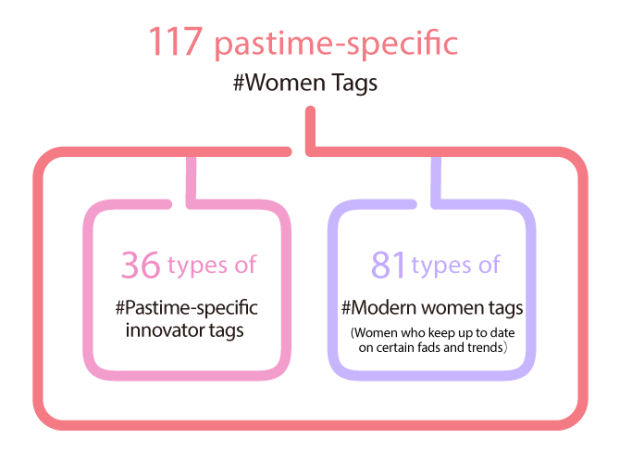
Among these two groups, we focused on the women labelled with #Pastime-specific innovator tags and defined them as pastime-specific innovators. These women are more knowledgeable about certain pastimes than people on average, and when asked or probed in discussions, they acknowledged that they loved, were engrossed in or were much more knowledgeable about their pastimes and interests compared with others.
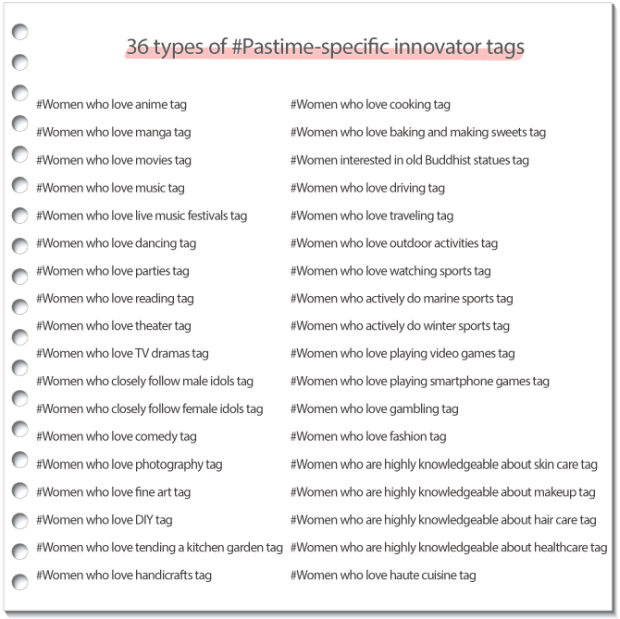
A noteworthy finding from the survey results was that 81.8% of the respondents were categorized with at least one #Pastime-specific innovator tag, and the average number of these tags per respondent was 5.1 tags. This indicates that many women categorized as pastime-specific innovators are enthusiastic and knowledgeable about multiple pastimes and interests.
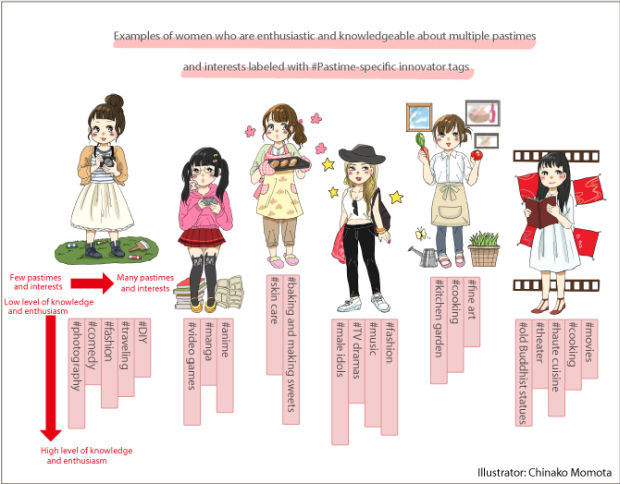
At the same time, the degree to which the women were informed about and dedicated to their respective pastimes and interests varied depending on each person.
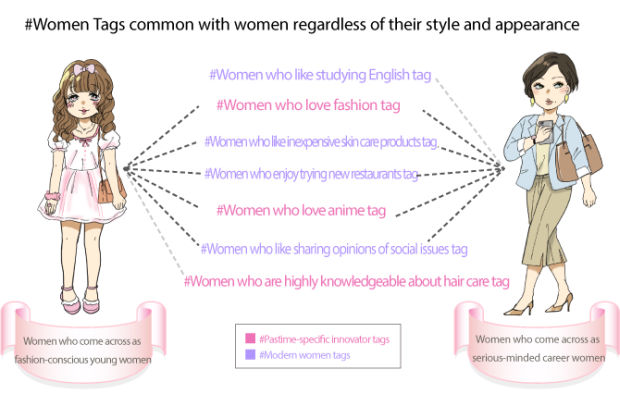
Every person has a wide variety of individual traits and tastes. In Japan, it is not uncommon for young women who wear flamboyant clothes to immerse themselves in a private life of video games and anime at home, generally avoiding a significant amount of interaction with others. It is not uncommon, however, to see young women talking about politics on their way home from the fashionable Shibuya district of Tokyo after buying a summer bikini.
By utilizing our #Women Tags concept, we can categorize people with the same tags as single groups, recognizing that they have a similar mindset despite having a different appearance, and then identify those respective markets.
Adapting to changing consumer behavior with marketing based on our tagging system
With the growing diversity of society today and the popularity of social media, the process by which consumers make decisions is changing. That means marketing campaigns must evolve accordingly.
Diverse individuals are viewable on the internet, and we can now connect virtually with people around the world whom we would never have known without the internet. When individuals and small groups of people form a viewable community online, demand also becomes viewable, making it easier for companies and individuals to offer new goods and services. As a result, the amount of options for goods and services is growing. With information, contacts, products, and services so readily obtainable, we have reached a time in which it is easier for anyone to choose what they want, lead the lifestyle they want, and deeply explore the things they like.
People made compromises when they had fewer alternatives, but now with so many options, people are less likely to compromise. The way consumers make decisions has changed from settling for the best available option to choosing the thing they like most, and this tendency to be uncompromising is growing even stronger.
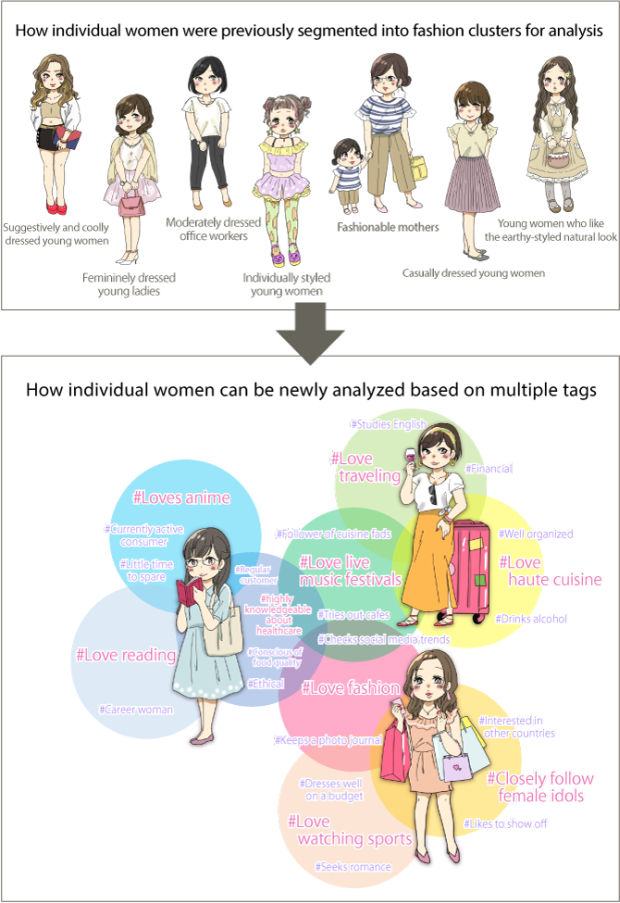
If marketing targets only five or six segments of women, such as young women who like urban fashion or women who are serious about their pastimes, those actual targets will not be visible.
Our #Women Tags approach offers an effective means for really understanding the targets of marketing, as it allows us to more precisely pinpoint women’s traits, interests, behavioral patterns, and other factors. That can lead to more and more new business opportunities.
We can understand how the women who responded to the survey with the same tags have a common outlook on their pastimes and interests by looking at people who are interested in similar things, who have had similar experiences, or other similarities. On social networking sites, a group of users who respond to posts with the hashtag #travel and a group that responds to #nails are made up of different but also overlapping members. Like each of those groups, it is important to understand the outlook of women from the perspective of which #Women Tags are associated with them.
Nowadays, there are a growing number of ways for women to express themselves, especially via social media, allowing us to see how each one expresses her individuality in various pastimes and interests. Many people gain information from social networking sites. Who is exploring each of the categories of pastimes and interests, and who has the most trustworthy information? Pressure is being put on those who are regarded as credible sources of information.
Furthermore, an increasing number of people seek out and buy things that are being purchased by those we categorise as pastime-specific innovators. What differs from the past is that the things being purchased are now viewable rather than things that have been recommended. Now everyone recognises that the people who frequently buy and use certain types of products and services are the ones who generally know whether those things are good. Accordingly, finding out whether something was purchased by a pastime-specific innovator now seems to be the easiest and most accurate way to obtain trustworthy information about such goods and services.
In other words, pastime-specific innovators are people who instigate and influence trends in such markets. It seems likely that they will also play an increasingly important role in the formation of markets going forward.
Ayaka Asami is a senior solutions planner at Dentsu.
This article was originally published on the Dentsu website on February 1, 2019.













